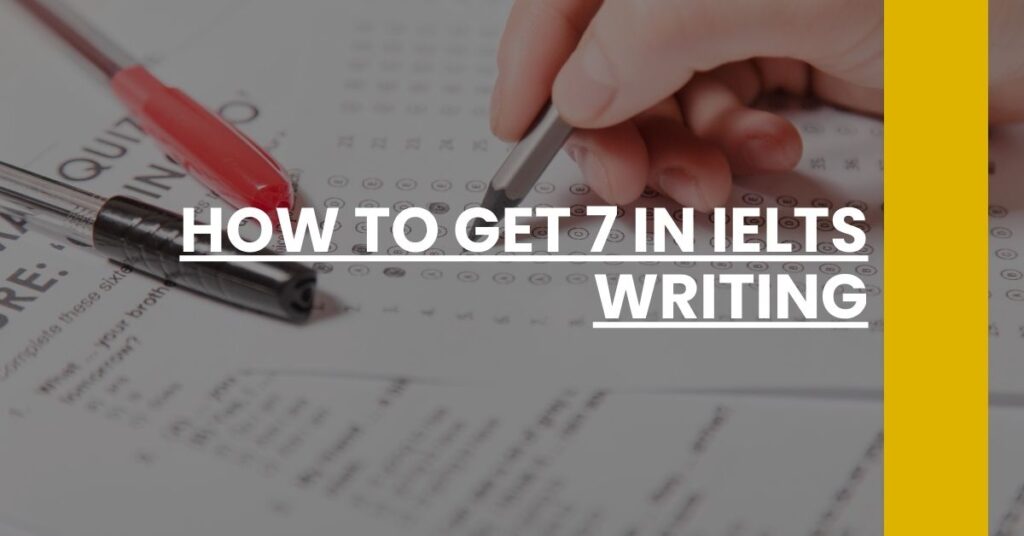Want to master how to get 7 in IELTS writing? Let’s get started.
- Tailored Study Plan: Discover personalized strategies to aim for a band 7 score.
- Expert Writing Techniques: Learn from industry insiders about enhancing your writing skills.
- Persistent Practice Routines: Find out the best practices for IELTS writing exercises.
Achieve your goal on how to get 7 in IELTS writing with our guidance.
- Understanding the IELTS Writing Band Descriptors
- Key Strategies for IELTS Writing Task 1
- Mastering IELTS Writing Task 2
- Enhancing Vocabulary for IELTS Writing
- Advanced Grammar for a Higher Score
- Effective Linking and Coherence
- The Art of Paraphrasing and Positioning
- Time Management and Practice Techniques
- Reviewing and Polishing Your Writing
- Utilizing Feedback to Improve
- Additional Resources and Materials
- Conclusion
Understanding the IELTS Writing Band Descriptors
When you’re aiming for a high score in IELTS Writing, it’s essential to know what the examiners are looking for. To secure a band 7, you need to demonstrate certain competencies across four areas, which are spelled out in the IELTS band descriptors. These areas are:
- Task Achievement/Response: You need to fully address the prompt, presenting a clear position throughout your response.
- Coherence and Cohesion: This means organizing your ideas logically and ensuring smooth progression throughout your essay.
- Lexical Resource: Showcasing a wide vocabulary and the ability to use words appropriately.
- Grammatical Range and Accuracy: Using a variety of sentence structures accurately.
What Does a Band 7 Essay Look Like?
For a band 7 essay, the key lies in the details:
- Task Achievement/Response: Directly answering the question and providing relevant main ideas that support your argument.
- Coherence and Cohesion: Writing paragraphs that flow together seamlessly, each one linking to the next.
- Lexical Resource: Employing less common vocabulary and paraphrasing skills effectively.
- Grammatical Range and Accuracy: Introducing a mix of complex sentence structures with few errors.
Understanding your IELTS score thoroughly can give you deeper insight into these descriptors.
The Examiner’s Checklist
When aiming for that band 7, keep in mind the following checklist that echoes the examiner’s mindset:
- Have you responded to the task fully and appropriately?
- Is your essay cohesive, with each idea logically flowing to the next?
- Do you demonstrate a wide vocabulary and the ability to use it?
- Are your sentences varied in structure and mostly error-free?
Studying IELTS scoring in detail could act as your mirror to self-assess your writing skills.
Key Strategies for IELTS Writing Task 1
For both the Academic and General Training versions, Task 1 poses different challenges. However, the one thing they have in common is the need for clarity and precision.
Academic Task 1: Data Interpretation
- Understanding the Data: Be sure to read the charts, tables, or graphs carefully.
- Structuring Your Essay: Typically, include an introduction, overview, and detailed paragraphs.
- Paraphrasing: Start by paraphrasing the question statement.
- Describing Trends: Use appropriate vocabulary to describe the data trends and comparisons.
General Training Task 1: Letter Writing
- Identifying the Tone: Determine if the letter should be formal or informal.
- Fulfilling the Task: Always make sure to cover all bullet points given in the task.
- Organizing Content: Start with a purpose statement, follow it with bullet-point-based paragraphs, and conclude cordially.
- Practicing Different Letters: Exposure to a variety of letter types is crucial for preparation.
Engage with IELTS Advantage for further guidance on excelling in IELTS Writing Task 1.
Mastering IELTS Writing Task 2
IELTS Writing Task 2 requires you to present and justify an opinion, discuss a topic, outline problems, and offer solutions. Here’s how you can leave a lasting impression and achieve a band 7 score.
Structuring Your Essay
An effective strategy is to break your essay into four key parts:
- Introduction: Introduce the topic and outline your main ideas.
- Main Body Paragraph 1: Develop your first main idea with explanations and examples.
- Main Body Paragraph 2: Explore your second main idea similarly.
- Conclusion: Summarize your viewpoints and restate your position clearly.
Crafting a Thesis Statement
- Clear Position: State your view on the issue clearly and concisely.
- Preview Main Ideas: Give the reader a preview of what to expect in your argument.
Enhancing Vocabulary for IELTS Writing
To reach a band 7, a robust vocabulary is your arsenal. It shows you can use the right words at the right time, not just for the sake of complexity but for precision.
Vocabulary Building Techniques:
Here are some strategies to help expand your command of the English language:
- Read Widely: Expose yourself to different texts and note down unfamiliar words.
- Learn Synonyms: This avoids repetition and shows versatility in language use.
- Use Word Families: Understanding the different forms of a word is beneficial.
- Practice, Practice, Practice: Incorporate new words into your writing to get familiar with them.
Try IELTS Advantage for a practical approach to vocabulary enhancement tailored to the IELTS test.
Advanced Grammar for a Higher Score
A band 7 reflects good control of a wide range of grammatical structures. You must demonstrate that you can use complex grammar with flexibility.
Building Grammatical Range:
- Mix Sentence Types: Use a combination of simple, compound, and complex sentences.
- Verb Tenses: Demonstrate an understanding of various verb tenses and their correct usages.
- Punctuation: Proper use of commas, periods, and semi-colons can impact the clarity of your writing.
To hone advanced grammatical structures, IELTS Material provides insights that can take your writing one step further.
Effective Linking and Coherence
A well-structured essay must flow seamlessly from one idea to the next, creating a narrative that’s easy to follow.
Cohesion with Linking Devices
Proper use of linking words — like ‘furthermore,’ ‘however,’ and ‘consequently’ — guide the examiner through your essay, clearly showing the relationship between ideas.
Ensuring Clear Progression
Each paragraph should begin with a topic sentence that introduces the main idea, followed by supporting sentences and a concluding sentence that ties the idea to your overall argument.
For a deep dive into how coherence and cohesion can enhance your essay, check out IELTS Tutorials, where they breakdown the intricacies of linking ideas skillfully.
By focusing on these areas and incorporating the strategies mentioned, how to get 7 in IELTS writing becomes not just an aspiration but an achievable target. Remember, practice is pivotal in mastering these techniques. Happy writing!
The Art of Paraphrasing and Positioning
Paraphrasing is not just about changing the words or the sentence structure. It’s about rethinking how you present an idea so that it’s both original and respects the thrust of the source material. And in IELTS writing, your ability to paraphrase can significantly influence your score.
Why Paraphrase?
Paraphrasing proves you understand the source language well enough to present it in a fresh manner. It’s key for:
- Avoiding Plagiarism: It demonstrates your own command of English rather than relying on memorized phrases.
- Showing Vocabulary Range: It’s an opportunity to use synonyms and various grammatical structures.
- Adapting the Tone: You can adjust the language to fit the formality of your essay.
How to Paraphrase Effectively
Consider these steps when paraphrasing:
- Understand Thoroughly: Full comprehension of the original is crucial.
- Use Synonyms Wisely: Replace words with their synonyms, but ensure they fit the context.
- Change Sentence Structure: Modify the order of information or transform active sentences to passive ones (or vice versa).
- Change Parts of Speech: Convert nouns to verbs, adjectives to adverbs, etc., where possible.
For a well-rounded understanding of paraphrasing, explore tools at IELTS Advantage that guide on this essential skill.
Consistent Positioning in Your Writing
Your position refers to your stance or opinion on the essay’s topic. It needs to be clear from the outset and consistent throughout the essay.
- Introduction: State your position explicitly in the thesis statement.
- Body Paragraphs: Ensure each paragraph supports your position directly or indirectly.
- Conclusion: Restate your position and summarize the argument supporting it.
Positioning is a critical factor on how to get 7 in IELTS writing because it frames your essay’s argument.
Time Management and Practice Techniques
So, you’ve sharpened your writing arsenal with vocabulary and grammar tools, but without effective time management, your band 7 dream can become a band 6 reality. Practicing under timed conditions will ensure you’re as sharp on test day as you are on your best practice day.
Balance Between Planning and Writing
- Planning Time: Spend about 5 minutes planning. Jot down your main ideas and how you will develop them.
- Writing Time: Allocate about 30 minutes to actual writing. This includes both Task 1 and Task 2.
- Review Time: Save around 5 minutes to go over what you’ve written.
Practice Routines
- Simulate Exam Conditions: Familiarize yourself with the time pressure and exam atmosphere.
- Monitor Performance: Track your timing and adjust your strategy accordingly.
Mastering time management will pave the way to understanding how to get 7 in IELTS writing, refining both your pace and technique. For a structured practice, consider joining a preparation course to simulate time-restricted exam conditions.
Reviewing and Polishing Your Writing
After writing down your thoughts, it’s review time. This is where good turns into great, where a potential band 6 escalates to the coveted band 7.
Quality over Quantity
Pay more attention to quality and clarity. Instead of trying to impress with unnecessary verbosity, focus on these:
- Eliminate Errors: Check for spelling, grammar, and punctuation.
- Streamline Your Argument: Remove any off-topic digressions.
- Polish Your Style: Enhance word choice and sentence variety.
A polished essay is the epitome of how to get 7 in IELTS writing due to its clarity and precision.
Utilizing Feedback to Improve
Feedback is the breakfast of champions, and in IELTS writing, it’s your roadmap from where you are to where you need to be.
How to Use Feedback
Use feedback to:
- Acknowledge Weaknesses: Understand what needs improving.
- Learn From Mistakes: Make changes based on the feedback received.
- Progress: Implement the feedback into your subsequent practice.
If you’re searching for professional assistance, many online platforms offer feedback from experienced IELTS tutors. Get started with personalized feedback from IELTS professionals.
Additional Resources and Materials
Empower your IELTS Writing preparation by tapping into various resources to supplement your study.
Exploring IELTS Resources
- Books: Look for reputable IELTS preparation books with practice tests and writing exercises.
- Websites: Websites like IELTS Liz offer a wealth of free information and tips.
- Online Courses: Consider enrolling in structured online courses that offer comprehensive writing modules.
Leverage these resources strategically, and remember that consistent practice is the secret sauce for how to get 7 in IELTS writing.
Conclusion
When approaching your IELTS Writing test with the query ‘how to get 7 in ielts writing,’ the path is clear: understand the scoring descriptors, master paraphrasing, position your argument consistently, manage your time, review, and use feedback effectively. By meticulously sharpening each aspect of your writing skills, and strategically utilizing a wealth of available resources, you’re setting yourself up for success. With dedication, the band 7 score will not just be a target but a triumph in your IELTS journey.
Learn how to get 7 in IELTS Writing with expert strategies, enhancing vocabulary, and practice techniques in our guide.

